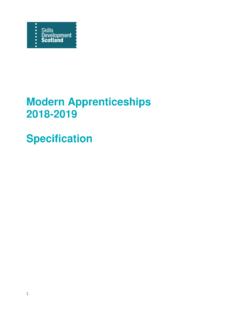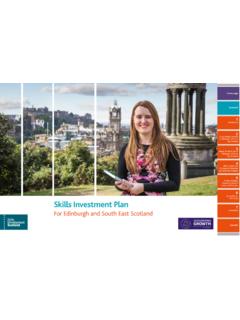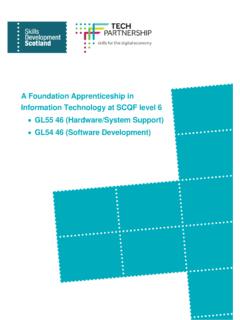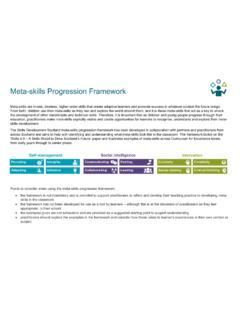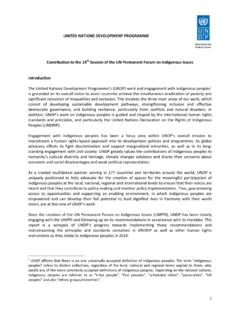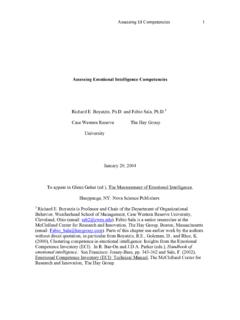Transcription of Skills Investment Plan - Skills Development Scotland
1 Skills Investment PlanFor Scotland s food and drink sector2nd editionForeword and introduction James Withers, Chief Executive, Scotland Food & DrinkScotland s food and drink sector has come a long way over the last ten years. From an industry whose growth was static, it is now one of the best performing sectors of the economy. This year, a new record annual turnover of billion was announced, a rise of over 40% in the industry s value since 2007. However, whilst pausing to reflect on success is important, our eyes are firmly on the plan for the future by recognising what the recipe for success has been over the last few years. One ingredient has been more important in our journey than any other; collaboration.
2 The industry now works collectively and in partnership with government and its key agencies. This new culture has forged a unity of purpose, a single strategy for growth and a collective mission to build Scotland s reputation as a land of food and drink and to drive the sector s , the creation of the Scotland Food & Drink partnership has brought a renewed focus to the Skills agenda, one of the fundamental building blocks of our strategy. Our partners in the public sector and private sector are crystal clear that we need to increase our Investment in and, crucially, our commitment to Skills and drink, like most sectors, will say that its most important asset is its workforce. But what do we mean by that statement?
3 Does it mean we are an industry willing to engage properly with our school pupils? Are we willing to commit to the next generation of apprentices? Are we engaged with universities and colleges? Do we recognise how critical Skills Investment in agriculture and fishing is to our manufacturing base? Unless we can answer emphatically yes to those questions, our statement will ring first Skills Investment plan was launched in 2012. This refreshed plan a product of the Scotland Food & Drink partnership alongside wide research and consultation with a range of employers and industry stakeholders from across the sector is the foundation to tackle those fundamental questions priorities it identifies raising the attractiveness of the sector, driving leadership and management excellence, Skills for business improvement and Skills for business growth reflect the issues faced by employers across the sector and offer a framework for action that could deliver real and lasting benefits to the , success in delivering this plan is a two-way deal.
4 The public sector has shown willingness to invest in this plan ; that is critical. But industry must invest itself too. From trade associations to individual companies, the onus on improving the attractiveness of our sector and stimulating our future workforce lies as much with us as anyone else. We recognise that and look forward to a new phase of work. With a new industry strategy for 2030 in Development , the timing is right to re-emphasise the central role of Skills Development in all we do and all we wish to achieve as an 11 A full list of the Standard Industrial Classification (SIC) codes included within this definition can be found in Annex food and drink Skills Investment plan (SIP) is a partnership document, facilitated by Skills Development Scotland (SDS) on behalf of the Scottish published the first food and drink SIP in June 2012.
5 The purpose of the SIP was to: validate and bring clarity to the scale and nature of the Skills issues facing the sector create direction and bring focus to the nature of the response required by both industry and the public sector to address these provide a framework for public and private sector Investment in Skills Development to meet the needs of industr is important to understand the specific industry sub-sectors that make up the food and drink sector. The SIP is based on the Scottish Government definition of food and drink1. This can be split into the following four main categories of activity: agriculture: including the activities associated with growing crops, raising animals, and hunting fishing and aquaculture: covering both marine and freshwater activities food manufacturing: covering all activities associated with the processing, preservation and manufacture of food drinks manufacturing.
6 Including the manufacture of soft drinks, mineral waters and alcoholic continued12 See Appendix 2 for details of Skills Group membersMuch has been achieved through collaboration on Skills Development since the launch of the food and drink SIP, with a range of new initiatives introduced to address the key Skills issues and challenges facing the industry. However, there remains ongoing demand for new and replacement labour across the sector. It is therefore vital to continue to build on what has been achieved so far, and to target future Investment to ensure that the industry has the right supply of people and Skills to support future growth. The SIP is a strategic document, setting out the key priorities for Skills Development within the food and drink sector.
7 It is designed as a three-year plan , with annual review to enable flexibility and responsiveness to changes in the economic and policy context, including publication of the refreshed Food and Drink Industry Strategy in Scotland Food & Drink Skills Group2 has overseen the SIP refresh process, having been actively engaged at all stages. The group will be responsible for taking forward implementation of the SIP Action plan , including consideration of how this will be resourced, and monitoring/reporting progress towards the key themes and priorities identified within : SIP refresh processDevelop SIP and Action PlanValidate with industryIdentify current Skills issues and prioritiesAssess current state of the sectorPublish SIP and Action PlanReview of progress against original SIPThe food and drink SIP forms a key component of the Scottish Skills Planning in Skills is central to boosting the productivity and competitiveness of the food and drink sector.
8 For this Investment to be effective, it must be targeted on meeting the needs of employers and individuals. The food and drink SIP provides a framework and focus to ensure that the Skills system is demand-led, linking Skills Development and growth. Fig : Skills Planning ModelThe Skills Planning ModelMaking Skills Work for ScotlandUnderstanding Skills Demand through: Direct employer engagement Input from our engagement with employer groups Insights through partner agencies and data researchEmployers:Are able to recruit the right people with the right Skills at the right choice through careersintelligenceIndividuals:Access a careers service that helps them pursue opportunities important to the economy and its learning provision with demand to develop the right skillsRegional and Sectoral Skills Investment PlansInvestment in responsive education and training provisionPurpose continued1 The food and drink SIP contributes to the priorities set out in the Government s Economic Strategy for s economic strategy sets out the Scottish government s purpose as to create a more successful country, with opportunities for all of Scotland to flourish, through increasing sustainable economic growth.
9 The strategy provides a framework for the achievement of these goals, with actions that will be targeted on four broad priority areas: investing in our people and our infrastructure in a sustainable way fostering a culture of innovation and research and Development promoting inclusive growth and creating opportunity through a fair and inclusive jobs market and regional cohesion promoting Scotland on the international stage to boost our trade and Investment , influence and refreshed SIP will make a significant contribution to each of these four priorities. Progress and achievements2 Significant progress has been made against the strategic priorities for Skills Development set out in the food and drink the food and drink SIP was published in June 2012, it identified four strategic priorities for the Development of Skills within the sector: raising the attractiveness of the sector to new entrants and retaining talent supporting company capacity to innovate driving leadership and management excellence in the sector supporting the Development of Skills for growth in the and partners have collectively focussed on the Skills issues facing the sector, and developed and delivered a range of interventions across each of the four priorities.
10 A selection of these achievements is highlighted in Table 1 with further narrative outlining progress on each of the Skills 1: Key achievements since 2012 Raising awarenessCapacity for innovationLeadership & managementSkills for GrowthDevelopment of My World of Work industry pages and delivery of 20+ careers adviser/ influencer eventsResearch to understand demand for food science/food technologist skills150 Scottish food and drink companies receiving support for leadership Development each yearDevelopment of food and drink industry pages on Our Skillsforce250 food and drink Skills ambassadors working with schools across ScotlandCreation of Scotland Food & Drink Skills Academy to facilitate better links between food & drinks manufacturing and the Skills /training sectorSE account managed companies in the food and drink

